Exploring the coach’s journey beyond a credential.
Anyone who has experienced great coaching knows the interaction can feel almost magical. Somehow, the coach knows exactly what to say and when to say it. You feel challenged, supported, and confident in your coach’s ability to help you achieve your goals. While great coaching can seem effortless, the reality is many skills, attributes, experiences, and techniques came together to create that coaching magic.
Coaching is about creating change. Great coaches produce great outcomes, in part, through what they do with athletes in the gym: teaching movement, identifying errors, cueing corrections, and pushing athletes to improve. These basic components of creating change also are very often missing when you watch a class run by a less competent coach.
However, the question of what makes a great coach runs deeper and is more complex than the components above. Great coaches have many different skills and attributes that work in concert to create outcomes beyond the comprehension of the average coach. It is not any single thing they do but rather everything they do. Great coaching can seem like magic, but that would belie the observable, measurable, and repeatable process that leads to the development of a great coach. It takes work and determination, but the journey to great coaching is one anyone can undertake.
So, how do we begin?
KNOWLEDGE
The starting point for the coach’s journey is the acquisition of KNOWLEDGE. A coach needs to understand the technical side of what the athlete is trying to achieve. A great coach knows what to do in any coaching situation.
For the beginner CrossFit coach, the knowledge journey should start with the CrossFit Level 1 Course. This course provides a broad introduction to the essential concepts required to teach CrossFit, but knowledge acquisition should not stop there. The more expansive the coach’s understanding of strength and conditioning in general and the human body specifically, the more effective they will be at coaching and the more readily they will be able to bring the Level 1 content to life.
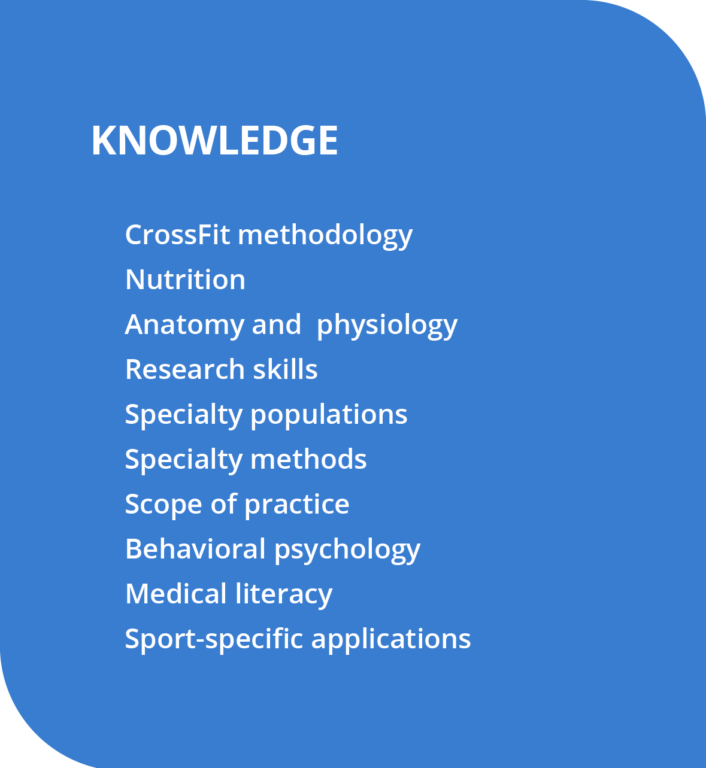
Beyond the Level 1, study should extend further into topics such as nutrition, anatomy, and physiology. Developing coaches also should pursue a greater understanding of all aspects of the CrossFit methodology. They should build a broad understanding of special populations, other training methods, and sport-specific applications so they can fully understand various ways to apply the methodology. Then, beyond the specific realm of strength and conditioning, coaches should develop a general knowledge of psychology, medical literacy, and research. The pursuit of knowledge needs to be voracious and never-ending.
Knowledge acquisition often is tangible and can take many forms: attending courses, reading, undertaking higher-education studies, and interacting with peers and colleagues. Insatiable curiosity and a commitment to lifelong learning are two common traits of coaches who have both broad and deep knowledge. Commit to daily reading and to challenging your mind in the same way we expect athletes to challenge their bodies. A minimum starting point would be to set aside 30 minutes every day for learning.
When gathering knowledge, the astute coach filters it through CrossFit’s definition of fitness, absorbing what is useful and eschewing what veers too far afield. Not all knowledge is directly applicable, but it is all beneficial. It can support critical thought and a better understanding of the principles that make training athletes with the CrossFit methodology so effective.
APPLICATION
Knowledge creates the foundation and is essential for coaching, but it is not alone sufficient to make the coach effective. If it were, the greatest gyms would be run by Ph.Ds. To put knowledge into practice, the coach needs to be able to apply knowledge in the right way and at the right time. This is the second area of coach development: APPLICATION. A great coach has the ability to apply their knowledge and skills for any athlete in any context.
The CrossFit Level 2 Certificate Course is a significant next step for the developing coach because it focuses on the practical application of the methodology. A key part of the Level 2 curriculum is examining the foundation of effective coaching through the lens of a CrossFit group class setting.
An effective coach has well-developed skills across six key areas, often referred to as “the six criteria.” To progress along the continuum from novice to expert, a developing coach must learn and practice the skills and techniques required to be competent in each of these six criteria. The Level 2 is an effective way to accelerate the process because it is a feedback-rich environment where coaches get the opportunity to practice in front of their peers. Importantly, they get to immediately implement feedback, which promotes rapid learning.
The following is a summary of the six criteria taught in the Level 2 course.
A great coach needs to be a great teacher. The hallmark of a great teacher is that they can distill a large body of knowledge into essential concepts and then communicate key points in a manner that promotes learning.
Great coaches can differentiate between correct and incorrect movement. They can see what needs to be improved in both static positions and dynamic phases of movement and also can discern between gross and subtle errors and improvements.
Beyond seeing movement errors, great coaches have the ability to bring about improvement in movement for all levels of athletes. The CrossFit coach needs an arsenal of cues and corrective drills. Importantly, an effective coach is relentless in driving improvement and upholding standards of movement.
Managing the group within the class setting creates many challenges for the coach. The great ones make it appear effortless. They can attend to every person as if they were the only one in the class. The CrossFit coach needs to be excellent at managing the logistics of running the class.
Great coaches have the ability to make people want to train with them. They express high levels of care and empathy, and they have a passion for service that allows them to easily and effectively connect with people. These less tangible skills can motivate athletes, make training enjoyable, and help the coach to more effectively deliver corrections.
Great coaches can supply a visual framework for instruction by providing examples of good movement and contrasting errors with correct mechanics. The foundation for this is a thorough awareness of one’s own movement. A coach does not need to be a perfect mover, but they should know where and how they fall short and be able to seek out a better visual example when needed.
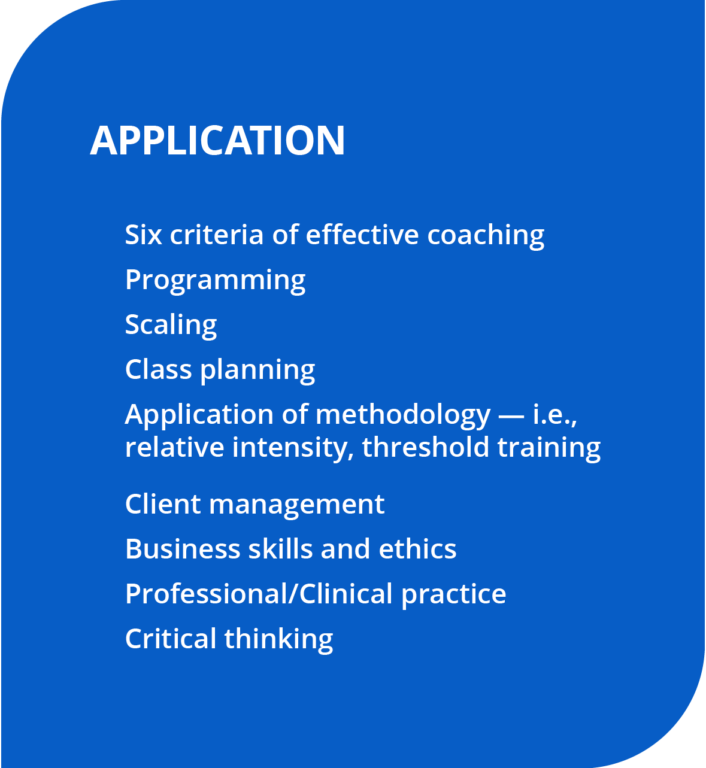 The coach who is well balanced across teaching, seeing, correcting, group management, presence, attitude, and demonstration has a basic but effective toolkit that will allow them to apply their knowledge. This should be considered the minimum skill set needed to do the job. If the Level 1 is the introduction to the methodology, the Level 2 should be considered the introduction to the implementation of the methodology. Together, these two credentials provide a solid foundation for the CrossFit coach — but this is still just the beginning.
The coach who is well balanced across teaching, seeing, correcting, group management, presence, attitude, and demonstration has a basic but effective toolkit that will allow them to apply their knowledge. This should be considered the minimum skill set needed to do the job. If the Level 1 is the introduction to the methodology, the Level 2 should be considered the introduction to the implementation of the methodology. Together, these two credentials provide a solid foundation for the CrossFit coach — but this is still just the beginning.
Take the skills and drills taught in the Level 2 and practice them in increasingly challenging situations. This can look like progressing from coaching one athlete to many. Seeking out on-the-job training and mentoring opportunities are other important and effective ways to put acquired knowledge into practice.
No amount of book learning or theory will support a coach’s ability to apply what they know. To become great at applying knowledge, a coach must learn by doing and by receiving feedback. This is why many feel the Level 2 is such a watershed experience: because it provides a bridge from theory to practice. For many, it is also their first opportunity to receive constructive feedback on the quality of their coaching.
RELATIONSHIP BUILDING
Being well developed in the areas of knowledge and application means the coach knows what to do and how to do it, but that does not guarantee effectiveness. Many experts may still struggle to coach, especially if they lack the ability to create and maintain meaningful relationships with their athletes. Ultimately, great coaches create great relationships and positive training environments that allow their athletes to thrive. RELATIONSHIP BUILDING is a key area of coaching and can be one of the more elusive skills a coach must develop; however, underestimating this skill’s importance will stifle a coach’s success. Relationship skills enable the coach to manage people and handle the problems that can occur in a dynamic setting like a CrossFit gym.
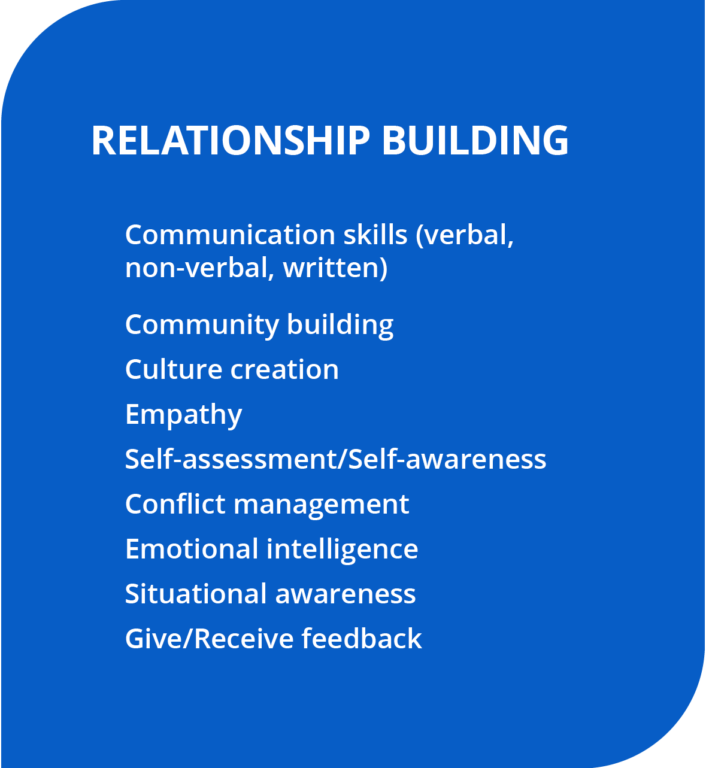 Coaches who are great at developing relationships tend to have highly developed emotional intelligence and self-awareness. Their communication skills are excellent, and they operate with a high degree of empathy and connection. These coaches are typically surrounded by strong communities and have gyms with positive culture, and this is no accident. Both have been purposely created and nurtured by the coach.
Coaches who are great at developing relationships tend to have highly developed emotional intelligence and self-awareness. Their communication skills are excellent, and they operate with a high degree of empathy and connection. These coaches are typically surrounded by strong communities and have gyms with positive culture, and this is no accident. Both have been purposely created and nurtured by the coach.
How do you develop this skill? Many resources are available, including courses, books, and programs, but the starting point is to be aware that relationship building is an active process that requires the coach to look for opportunities to connect with athletes. Paying attention to how you interact with people and noticing how others react to you is a key part of the developmental process. Relationship building requires you to see the athlete as a whole person and respect the role training plays in the broader canvas of their life.
Identify a great coach and watch carefully as they interact with their athletes. Imagine nothing is an accident and try to imitate or incorporate what they do into your toolkit. Copying great role models is an effective way to develop relationship skills, especially at the beginning.
In the coaching journey, this is perhaps the area that is most self-directed, and it requires the coach to take an honest look in the mirror and to seek feedback from other coaches or mentors wherever possible. Do people enjoy being around you? Do you seek to understand what your athletes are thinking and feeling? Do you consider the needs of others? Do you understand the context for other people’s behavior? Why do some athletes respond to your coaching cues but others ignore you? Do you understand what is happening in your athletes’ lives outside the gym? This may be an area where you need to seek out a trusted adviser and get honest feedback on where your relationship strengths and weaknesses lie. This can be ego-challenging work, but it is important and pays dividends.
A great coach uses relationship skills very deliberately to connect with people in a meaningful and enduring way. The best coaches are able to read subtle differences in personality, motivation, and emotions to fine-tune the training experience and customize it to the individual.
LEADERSHIP
The final piece of the puzzle is LEADERSHIP. Leadership includes a broad collection of skills and abilities that allow the coach to create a vision, set an appropriate strategy, and apply influence where and when it matters. Great leaders have a growth mindset, seeing obstacles as challenges and learning experiences. They have a high degree of credibility and understand the process of mentoring. People are attracted to them because of their professionalism and service mindset.
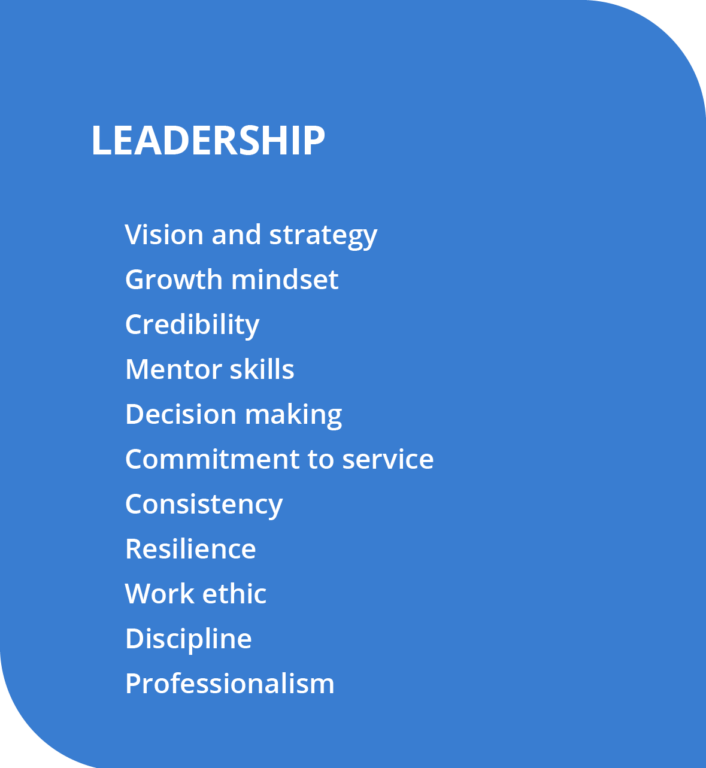 Developing leadership skills should be a process that runs in parallel with developing the other areas of coaching. As is the case with relationship skills, coaches can tap into a large body of knowledge that includes courses and books, but ideally, this area should be developed through mentoring and on-the-job training.
Developing leadership skills should be a process that runs in parallel with developing the other areas of coaching. As is the case with relationship skills, coaches can tap into a large body of knowledge that includes courses and books, but ideally, this area should be developed through mentoring and on-the-job training.
Leadership is the attribute that gets the athlete to do the work they need to do. Getting people to consistently comply with the program is a major challenge and probably the single-most significant factor driving the athlete’s success. You can’t coach the athlete who doesn’t show up, you can’t lead the athlete who won’t follow you, and progress will be undermined if athletes aren’t trying. Leaders can exert influence over all these factors that contribute to an athlete’s success.
Leadership is also about managing the dynamics and interactions of the group over time and motivating people to want the things they need most to progress. The reality of coaching is that people are often volatile, and many elements need to be managed to prevent athletes from drifting away from the program and group. Great leadership keeps the group cohesive and athletes purposefully working toward their goals.
EXPERIENCE - THE GLUE THAT BINDS IT TOGETHER
Being well developed in all four areas of coaching creates a framework for great coaching, but the sum is greater than the parts, and to leverage these skills, coaches need to practice dynamically blending them together in response to different situations. The ability to skillfully blend these skills develops only through EXPERIENCE.
Knowledge, application, relationship building, and leadership can be developed as isolated skill sets, but a coach needs experience to glue the pieces together and bring them to life. Ultimately, great coaches are forged through experience, and the more challenging the experiences the better. Without adequate experience, the coach is just a hodgepodge of tricks.
But here is the catch: Not all experience is equal. It is not just time in the trenches that binds and develops skills. The time spent gaining experience must be made purposeful by actively applying skills and striving to be better. The most developmental experience is that which is gained right on the threshold of your coaching ability.
Every time a coach tries to apply what they know in a real-world setting, and importantly, pays attention to the result, they are moving one step further along the coach development continuum, one step closer to greatness. This is no small point. Experience is the only way to operationalize the four areas of coach development. Ultimately, to get better at coaching, you have to coach.
A great coach is constantly paying attention to and learning from their coaching experiences.
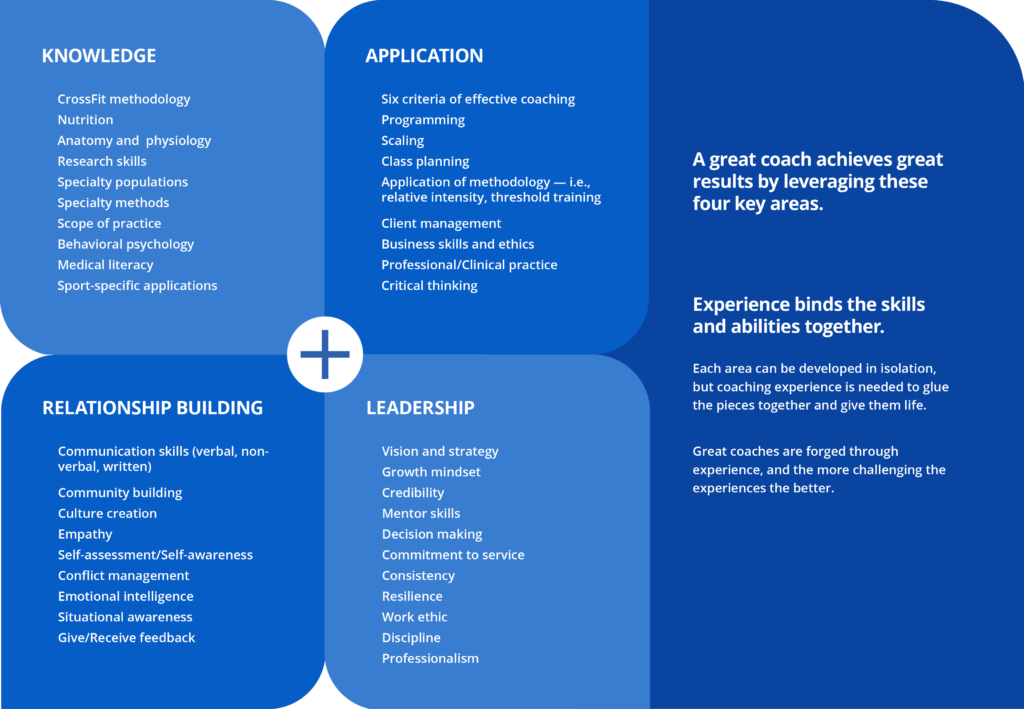
THE COACH DEVELOPMENT PROCESS
We can define what makes a great coach and how to become one — combine knowledge, application, relationship building, and leadership with experience and you have the recipe for great coaching. Significantly, the potential to be great exists for all those who sign on to the coach development process and apply themselves the same way great athletes apply themselves to training. The coach development process can be summarized as follows and should continue ad infinitum throughout a coach’s career.
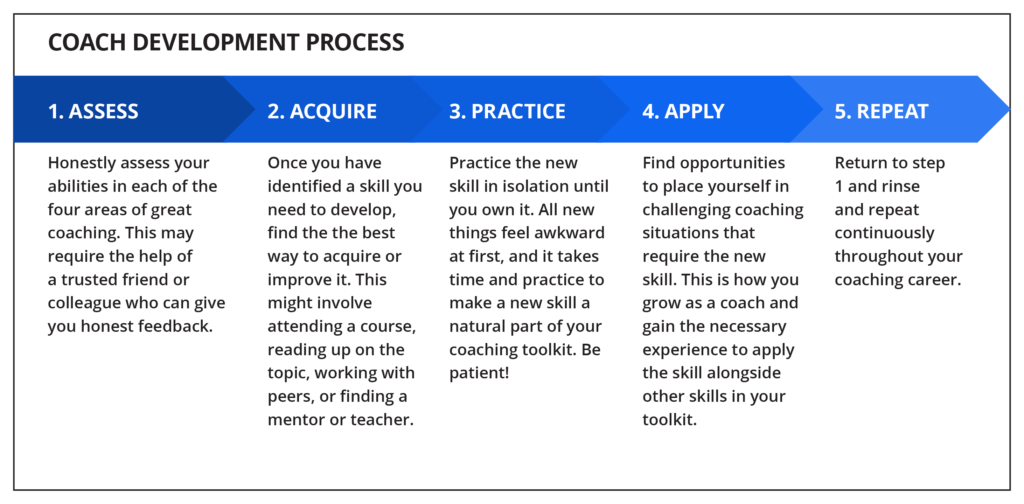
THE JOURNEY IS THE REWARD!
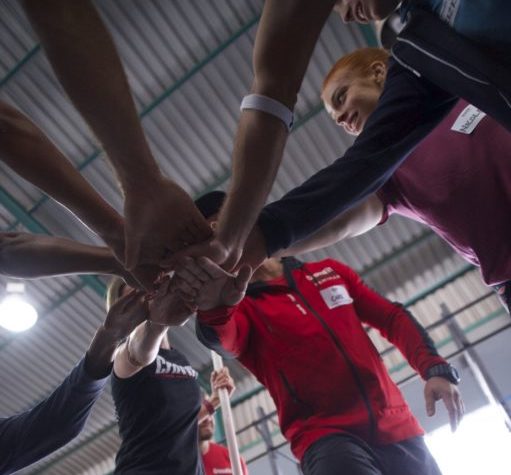 The process takes work and commitment, and it is certainly no easy road. But it works and is the secret behind masterful coaching.
The process takes work and commitment, and it is certainly no easy road. But it works and is the secret behind masterful coaching.
Like all things in life that are worth doing, the journey to becoming a great coach is itself the reward. There is also no downside. Every step along the path makes your coaching life better, more enjoyable, and much more effective.
Great coaches are not magicians, and they are not born that way. Rather, they are forged through learning, practice, and experience. They become great because they strive to be great. At the deepest level, the coach’s ability to change others for the better is directly correlated with their ability to change themselves first.
About the Author
Matt Swift is the Senior Manager of Content for CrossFit’s Education Department and author of the CrossFit Masters Course. He opened CrossFit Brisbane in 2006, worked as a Flowmaster on the CrossFit Seminar Staff, and has competed in three CrossFit Games in the masters division. He is a Certified CrossFit Coach (CF-L4) and a keen Olympic lifter and Brazilian jiujitsu practitioner.
Comments on What Makes a Great Coach?
Questo articolo fa un lavoro eccezionale nell'illustrare la complessità e la profondità del coaching di alto livello. Spesso, si tende a considerare il coaching come un'abilità basata esclusivamente sulle competenze tecniche, come l'insegnamento del movimento o la correzione degli errori. Tuttavia, l'articolo va oltre, esplorando come il vero valore di un grande allenatore risieda nella sinergia tra molteplici abilità e attributi che si uniscono per creare un'esperienza di coaching che può sembrare quasi magica.
L'autore mette in luce come il coaching efficace non sia solo una questione di conoscenze tecniche, ma anche di capacità di ispirare, motivare e comprendere profondamente i bisogni e i potenziali degli atleti. Questo approccio integrato è ciò che distingue un allenatore straordinario da uno semplicemente competente.
In sintesi, l'articolo non solo celebra l'importanza del coaching ma invita anche a riconoscere il duro lavoro.
I was cheated on by my partner and her fitness coach. She swore that nothing happened, but I just couldn't shake the feeling that She had been unfaithful to me. So I did some research online and found Y3llowl4bs. They told me everything, the name and address of the fitness coach, where they met, how they would meet up and it broke my heart. But what hurt even more was knowing that She had lied to me; that She had gone behind my back and betrayed me.
Thanks for the article
I gonna read it every week to seek out improvements in my coaching skills and as a human
I love to regularly read this article since it has been released. It’s a great resource that holds you to the basic core principles of the methodology and gives you the practical applications of it in order to coach effectively and making people better at 360 degrees. This is pure gold for CrossFit Trainers! Thanks for sharing Matt!!
I have it bookmarked for the same reason and regularly share it in our coaches group for reflection!
Obrigada pelo artigo. Crossfit é incrível
Thanks for the article. Crossfit is amazing
A great theoretical write-up, lately cf classes just feels like a bunch of people who want to come in and move around and socialize. I use to be so into researching and preparing for classes but I've been struggling so sooo hard with staying positive in classes. I was even thinking for a while of going for my L3 but it seems like no one cares to learn or get better or even complete the warm up. I don't know if it's my pride or what but I'm losing my passion rapidly when the majority of group fitness athletes coming in don't seem to care much.
I hear you, Jamie. I started CrossFit in 2017 (in my 50s)! It has changed my life. I am getting my L1 this June. Scared. I don't know anything about coaching. Doing a WOD and helping others DO a WOD - not the same thing. But I also see what you mean ... CrossFit is not just a trend or a way for someone to lose weight. Nutrition is so so important and the key that unlocks the rest of the CrossFit methodology. Thanks for being vulnerable.
I hear you, Jamie. I started CrossFit in 2017 (in my 50s)! It has changed my life. I am getting my L1 this June. Scared. I don't know anything about coaching. Doing a WOD and helping others DO a WOD - not the same thing. But I also see what you mean ... CrossFit is not just a trend or a way for someone to lose weight. Nutrition is so so important and the key that unlocks the rest of the CrossFit methodology. Thanks for being vulnerable.
Nice call to action.
I would love to see these offerings with a PDF link, if possible. I'd love to add them to my study binder!
If you mean transform this page into a PDF, just hit print and choose PDF as the printer output and voilà, you have it 💪!
Great insight on what the best coaches of our community do. Always remember you can improve. There is no magic in the process, just hard work at refining our craft witch creates magic in the results of your clients.
Thank you for the great article . Crossfit is awesome sport.
Thank you for this great article!
This is amazing! Thanks a lot.
Top
Brilliant article, thanks Matt!
Inspiring! Let the journey begin.
Thanks for sharing this great article !
Could you recommend books/articles about relationship building ?
Hi Sebastien,
There are MANY! Here are 4 that have had a big impact on me ...
- "How to Win Friends & Influence People" - Dale Carnegie
- "Tricky People" - Andrew Fuller
- "The four mindsets" - Anna-Lucia Mackay
- "The power of connection" Rik Rushton
Enjoy!
Cheers,
Matt
Appreciations for activating key coaching elements. I am revalidating my credentials after a few years away from coaching. This article jacks me up!
Thank you so much for this, loved it 😍
Thank you! Really makes a difference to my development as a new coach when I read such articles. Love it! :)
"Identify a great coach and watch carefully as they interact with their athletes. Imagine nothing is an accident and try to imitate or incorporate what they do into your toolkit."
^^This, for sure. And it's also important for athletes to do this also - whether that's for CrossFit movements or sports in general. Recently we've been putting a lot of emphasis on less of me talking and, "Hey guys, watch Dillon... okay, spend 30 seconds trying to mimic that."
This article is a masterpiece!
Was a great piece of reading, I remembered my L1, L2 and all the group classes and coaching experiences that I have had through the years. Thanks!!!
Yes! This article is right on point! Really enjoyed it.
Blown away by this article! So much to pull from this! Thank you for writing this for us.
Wow! The breadth and depth of this article has certainly provided an amazing stimulus for continual learning!
Thanks, Matt Swift for an inspiring piece!
Thank you!! Just it, so fantastic!
Thank you! Just it.
It is a kind of exceptional article that you immediately would love to put into your favorite document for repetitive reading every once in a while.
This article should NOT be open access, is full of amazing concepts and as always explained in a perfect way. We should pay to read this and who disagree is not worth what's written on it.
This model really puts things in the proper perspective. Love this return to instructor education.
Exceptional article, thank you!
Very timely for me as a new coach. Thank you
Great article! Thank you for sharing.
I love what you guys are doing! This article was excellent.
Very excited to see the announcement of the new Professional Coach publication. What a great article to kick things off. Great job Matt!
One of the best articles I have ever read on coaching. Well done Matt!
Fantastic Article! Thanks for taking the time to share.
Yeeeeees, this is it!
What Makes a Great Coach?
45